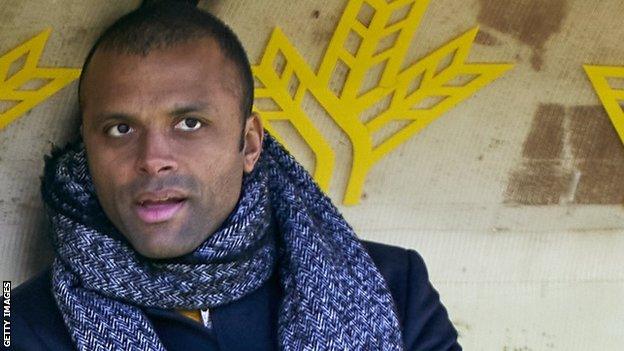Football authorities close to agreeing industry-wide dementia fund
- Published

PFA chief executive Maheta Molango says the situation regarding support for dementia is "urgent"
A joint dementia care fund "draft action plan" is close to being agreed by English football's leading authorities.
The Premier League, English Football League (EFL), Football Association (FA) and Professional Footballers' Association (PFA) have provisionally agreed to an industry-wide fund to support players living with dementia and other neurodegenerative conditions.
It has been two years since the PFA called for this kind of support.
But the union's new chief executive told the BBC that commitment regarding the level of the support had not yet been decided, as the "size of the problem" needs to be understood.
Maheta Molango said the parameters must be worked out with families, but anticipates this will be more about "bridging the gap" to help families rather than covering larger costs like home care.
Asked when the financial help would start, Molango said he considered the matter "urgent" but could not estimate a timescale.
"Internally the PFA will launch a very comprehensive data transformation project," he said.
"In parallel, what we've suggested to the other stakeholders is to launch a specific data project, linked to identify the size of the problem, and I see no reason why this project cannot be launched within the next few weeks.
"At the same time, the PFA wants to be a serious, sophisticated institution, that does things based on science.
"Attaching a specific timeline is difficult for me at this stage.
"But when you see the way that some of those members just deteriorate, day after day because of this terrible disease, you cannot wait."
He added: "We're going to push for this to happen as soon as possible."
In October 2019, the PFA called for the Premier League to help set up an industry-wide approach to care costs.
It followed a study that showed former professional footballers were three and a half times more likely to die of dementia than people of the same age range in the general population.
The PFA has been criticised in recent years for its approach to brain injuries in football.
At the end of last year the players' union set up a dementia taskforce to examine the issue of brain injury diseases in football, involving Dawn Astle, the daughter of Jeff Astle, and Rachel Walden, the daughter of Rod Taylor.
The PFA charity has been offering means-tested grants towards respite care, care in the home and home adaptations for families affected by dementia.
In a statement, the PFA said the full details of the fund would be revealed "once football families living with dementia have confirmed the proposal meets their needs".
"What we are hearing from the families is that no-one is asking to get everything paid; they are all very conscious of the fact that we are talking about huge costs, especially home care," said Molango.
"They are saying help us bridge the gap. Some of them have had to stop working to care for their loved one."
Molango said he had been "surprised" by the collaboration between football bodies, but attributed this to a "changing of the guard".
He added: "My perception is the commitment is firm and there is an actual willingness to address this issue."

Do you have coulrophobia? Find out why clowns have become so spooky
'We don't take enough care': Tony Pulis reveals the worst part of being football manager
